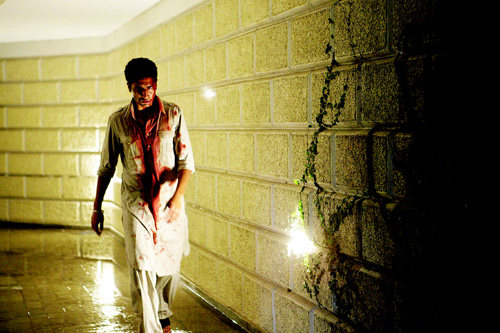01/10/2015
01/10/2015
 An undated handout photo released by the Busan International Film Festival (BIFF) on Sept 29, 2015 shows a scene from Indian film ‘Zubaan’. (AFP)
An undated handout photo released by the Busan International Film Festival (BIFF) on Sept 29, 2015 shows a scene from Indian film ‘Zubaan’. (AFP)SEOUL, Sept 29, (AFP): Asia’s most influential film festival kicks off Thursday in the South Korean port city of Busan, celebrating its 20th anniversary at a time of growing regional clout in the global movie market. “An increasing number of filmmakers from around the world are paying attention to the importance and potential of Asian cinema and the market here,” said actress Kang Soo-Yeon, co-director of the Busan International Film Festival (BIFF). “BIFF has always recognised the importance of Asian cinema and aimed to help introduce the region’s rising talent,” Kang told AFP.
This year, the 10-day festival will open with the world premiere of Indian drama “Zubaan” by first-time director Mozez Singh. BIFF has never had a Bollywood production as its curtain raiser and Singh described the selection of his movie as a “wonderful turn of events.” “All you really want is to make the best possible film that will reach out to as many people around the world as possible. Busan will give ‘Zubaan’ this chance,” he said
The coming-of-age feature follows the story of a young man who uses music to question his role in modern Indian society. “BIFF has constantly broken new ground by empowering new and young film makers and it continues to do so,” Singh said. The festival’s 20th edition will showcase 304 movies from 75 countries, including 94 world premiers.
Asian superstars such as Korea’s Jun Ji-Hyun and Lee Jung-Jae, China’s Tang Wei and Taiwan’s Chang Chen will walk the red carpet alongside Hollywood A-listers like Harvey Kietel and Tilda Swinton and Europe’s Sophie Marceau and Nastassja Kinski.
The combined box office collect of Asia’s biggest movie markets — China, Japan, India, South Korea, Taiwan and Indonesia — out-earned North America for the first time last year by $10.5 billion to $10.4 billion, according to the Motion Picture Association of America.
Much of that was down to stellar growth in China where box-office receipts surged 38 percent from 2013 to $4.8 billion. Growth in the first eight months of this year is estimated to have been even higher at 49 percent, and the Chinese market alone is expected to out-earn North America by 2018.
In the 20 years of its existence, BIFF has prided itself on identifying the filmmakers who have helped spur the industry’s growth in the region and on championing the cause of independent Asian cinema. Multi-award winning Korean directors Bong Joon-Ho and Kim Ki-Duk’s early work was first introduced to the world at the festival, as was the work of China’s box office king Feng Xiaogang.
Bong and Feng have gone on to direct Hollywood-funded productions – Bong with the sci-fi thriller “Snowpiercer” (2013) and Feng with the war drama “Back to 1942” (2012).
BIFF’s Window on Asian Cinema and Korean Cinema Today programmes are designed to give audiences a look at who might be coming next.
Here are top films that look set to stand out from the pack and generate a particular buzz at what has become Asia’s most influential cinema showcase.
* “Zubaan” (India)
The first Bollywood film selected to open BIFF in a year that India’s film industry produced two of its biggest global box office hits — “PK” and “Bajrangi Bhaijaan.” Also notable for being by a first-time director, Mozez Singh, one of India’s most promising screenwriters. The film follows a man who uses music to question his role in life.
* “The Battle of Gwangju” (South Korea)
Director Yi Ji-Sang uses an experimental style to chart one day in the life of an assortment of citizens who fought military police in support of the 1980 student uprising in the South Korean city of Gwangju. It’s the latest in a series of films to address sensitive moments in South Korea’s recent past — some to great critical and commercial success like courtroom drama “The Attorney” (2013).
* “Bad Guys Always Die” (China/S. Korea)
A crime thriller-comedy from first-time Chinese director Sun Hao, backed by two of the most successful filmmakers in China and South Korea — Feng Xiaogang and Kang Je-Gyu. The two veterans say the project is all about passing the baton on to a new generation. Set on the South Korean holiday island of Jeju, the film stars Taiwanese heartthrob Chen Bolin as a mild mannered school teacher and South Korea’s Son Ye-Jin as the mysterious hitwoman he becomes entangled with.
* “Twenty Two” (China/S. Korea)
A documentary on the lives of 22 surviving Chinese “comfort women” — forced to work in Japanese military brothels during World War II.Director Guo Ke made a short entitled “Thirty Two” in 2013 but 10 of the women have since died. The comfort women issue remains a highly sensitive and emotive one in China and South Korea where most of the women were forcibly recruited. The film is in a very strong field for this year’s Wide Angle documentary competition at BIFF.
* “The DMZ” (South Korea)
This 1965 film was the first to be shot in the demilitarised zone (DMZ) set up 12 years before at the end of the Korean War as a buffer zone between North and South Korea. It was thought for decades that the film was lost until a print was found in 2005. Director Park Sang-ho used “non-actors” to play a brother and sister eking out a living in the DMZ, and the film looked so real that people initially thought it was a documentary. A rare and timely look at a classic given recent tensions on the peninsula.


